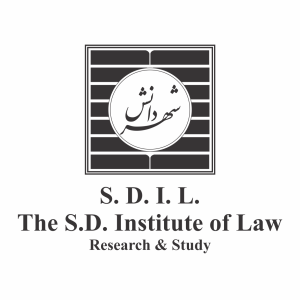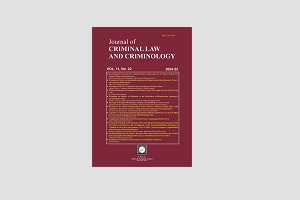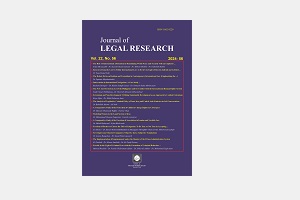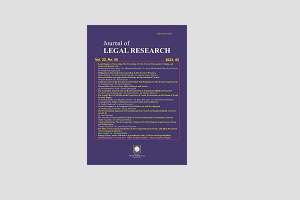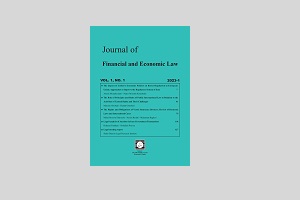Journal of
Legal Research
Number 21
Vol.XI No.1
Spring-Summer 2012
Managing Editor: Vahid Eshtiagh
Editor-in-Chief: Seyyed Ghasem Zamani
CONTENTS
Articles
Compulsory Licenses for Intellectual Property: Challenges among Developing and Developed Countries
Mahmood Bagheri (Ph.D.) & Simin Abbasi
Survey and Analyze of the Legal Language in Iran in the light of
Modern Scientific Languages
Hossein Simaee Sarraf (Ph.D.) & Hamed Malekshahi
Unjust Enrichment in Iranian Law in the light of UN Convention against Corruption
Seyed Mansoor Mirsaeedi & Hojjat Najarzadeh Ahari
New Achievements of England Arbitration Act 1996 in compare with Iranian International Trade Arbitration Act
HamidReza Alikhani & Saeid Abasi
Right of Fair Trial in pre-Trial Investigation in ECHR Practice
Nafisseh Bahrami
Moving towards Lawmaking and Contemporary approach: Jurisprudence in the Context of ICJ
Amir Arsalan Rasoolpour & Abdollah Abedini
Executive Regulations of Fines in Penal law of Iran and England
Maryam Hemmati
Reflections on Radovan Karadzic Case: Butcher of Balkan
Heybatoolah Nazhandi Manesh (Ph.D.)
Articles
Compulsory Licenses for Intellectual Property:
Challenges among Developing and Developed Countries
Mahmood Bagheri (Ph.D.) & Simin Abbasi
Abstract:
Compulsory licensing is one of cooperation ways between intellectual property law and competition law. A compulsory license is a permission from a public authority to exploit an invention without the consent of the patent holder. The licensing usually uses in all legal system to restraint intellectual property owner from abuse. Fundamental difference between legal systems is spread compulsory licensing for health and commercial purposes but developed countries use the licensing with limited usage and with special circumstances. In fact, each of them decides according to their economy and interests.
Keywords: Compulsory License, Intellectual Property, Developing Countries, Public Health, Pharmaceutical Compaies
Survey and Analyze of the Legal Language
In Iran in the light of Modern Scientific Languages
Hossein Simaee Sarraf (Ph.D.) & Hamed Malekshahi
Abstract:
Since language is the basis for all human interactions and since science as an action takes place in the context of language, this paper intends to analyze the characteristics, changes, and fluctuations of the legal language in Iran in the light of modern scientific languages. For this purpose, first of all such concepts as modernity, scientific spirit, and scientific language and its characteristics will be examined as an introduction to the subject. The significance of the legal language and legal terms is not less than the legal science itself. As we proceed, we face such questions as follow: how does the language of law in Iran as a scientific language make its scientific terms and vocabulary? Dose it depend on Persian language or Arabic language Although some unsystematic and inconstant efforts have been made to use Persian terms and vocabulary (which will be analyze as part of the fluctuations of the legal language in Iran), it can be said that the legal language in Iran depends heavily on Arabic language.
Keywords: Scientific Language, Iranian Law, Vocabulary, Persian Language, Arabic Language
New Achievements of England Arbitration Act 1996 in compare with
Iranian International Trade Arbitration Act
HamidReza Alikhani & Saeid Abasi
Abstract:
In 1996, England new arbitration act was adopted. This act was an comprehensive one and was applicable to both internal and international arbitrations. By passing this act, some new legal institutions entered into England legal order, some earlier provisions changed, and some existing rules in common law transferred into positive law. In the same manner, in 1997, Iranian international trade arbitration act was passed which was the first act exclusively in the field of arbitrations. Unlike the England arbitration act, this act is applicable only to international arbitrations. This Act, entered some new legal concepts into legal order of Iran and made a huge evolution in this area. Iranian Act, however, is an adaptation from UNCITRAL model law, but developed the arbitration rules of Iran to the global most known and developed rules in this field.
Keywords: Arbitration Act, England, Iran, New Achievements
Right of Fair Trial
in pre-Trial Investigation in ECHR Practice
Nafisseh Bahrami
Abstract:
With the legislation of the European Convention on Human Rights and fundamental Freedoms in 1950 and with the examination of the judgments made by the European court of Human Rights, dealt with in this Essay, the basic role of such rights in the introductory phase of pre-trial investigation is well proved. The Principle of Innocence has a close relationship with the Principle of Autonomy and Impartiality, the violation of each of these principles, shall result in the violation of the other ones. On the other hand, if the suspect is entitled to freely contact their attorney, due preparation for the Defense Bill shall be made feasible. The right to enjoy language assistance or having a translator, is the third right, which results in a fair trial, even in contumacy proceedings. Moreover, the right to be immediately and carefully informed of the reason and nature of the charge in an understandable language is one the other requirements of a fair trial. It is mentionable that the duration necessary for the provision of defense preparations may be different in each case. The right of liberty of the suspect during the court procedure is another right, which is deemed to be an absolute right within the Convention and the application of any limitations on it shall be unacceptable. As a result, it may be claimed that the rights related to far trial are respected in the phase of pre- trial investigation; a fair trial may be expected.
Keywords: Human Rights, Fair Trial, Pre-Trial Investigation, ECHR, European Convention on Human Rights and Fundamental Freedoms
Moving towards Lawmaking and Contemporary
Approach: Jurisprudence in the Context of ICJ
Amir Arsalan Rasoolpour & Abdollah Abedini
Abstract:
International law is a system in which the rules, principles and norms from its legal foundation. In this area, structural characteristics of the system, based on legal equality of states, is different from ethos of domestic and transnational orders. Decentralization is a prominent feature involve whit international legal order. Therefore, international case law (jurisprudence) which is reflection of states consent in order to peaceful settlement of disputes has deserved, more than this, to pay attention to it. Hence, the authors have this view that parallel of static and dynamic transformations in international community, international case law is also moving from as a secondary and subsidiary means of determinations of rules of law to as a primarily and principal sources of international law. The focus of this paper will be on the international court of justice.
Keywords: International Law, Sources, International Case Law, International Court of Justice
